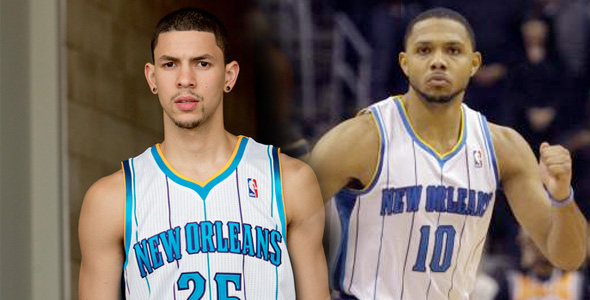After winning the 2012 NBA Draft Lottery and obtaining the top pick in the draft, the New Orleans Hornets began their plan to rebuild their franchise. Starting shooting guard, Eric Gordon, averaged 20.6 points per game during the 2011-12 season and will return to the team after New Orleans matched a four-year, $58 million Phoenix Sun offer sheet. After selecting Kentucky forward, Anthony Davis with the first pick in the 2012 draft, the Hornets then selected Duke guard Austin Rivers with the 10th pick.
The Hornets are hoping that Gordon, Davis, and Rivers will form a young nucleus that the team can build around for years to come. While Davis will provide the anchor in the frontcourt for this team, Gordon and Rivers will form an interesting dynamic in the backcourt. The Hornets traded last year’s starting point guard Jarrett Jack to the Golden State Warriors which leaves Greivis Vazquez as the only guard on the roster with experience playing the point guard position. This begs the question: can Gordon and Rivers co-exist in the Hornets’ backcourt?
With Gordon established as the team’s starting shooting guard, there is the possibility that Rivers becomes the team’s new point guard. If so, there will be a tremendous learning curve for Rivers to make that transition. Rivers is used to having the basketball in his hands, but mostly in a scoring capacity. During his freshman year at Duke, Rivers totaled 71 assists (2.1 per game) and 79 turnovers (2.3 per game) in 34 games. Rivers has handled the majority of the point guard duties during the Summer League and has struggled thus far. In the two games that he has played, both Hornets’ losses, Rivers has a total of seven assists and six turnovers. Defensively, he will also potentially struggle to guard smaller and quicker NBA point guards. In the first game of the Summer League, Portland draft pick and point guard, Damian Lillard finished the game with 25 points as Portland defeated New Orleans 85-82.
There is also the possibility that Rivers will accept a role similar to James Harden in Oklahoma City. Would Austin Rivers be willing to accept that type of role? However prior to the draft process, Rivers was criticized for his confidence, which some critics labeled as cockiness. The question also remains whether Austin Rivers could be effective in that type of role at the NBA level. During his year at Duke, Rivers showed an inconsistent jump shot, shooting 43.3% from the field, 36.5% from three-point range, and 65.8% from the free throw line. In his two Summer League games, he has struggled even further. He has shot 21.1% from the field, 12.5% from three-point range, and 61.1% from the free throw line. Entering the draft Rivers was lauded for his ability to create his own shot, an ability that he has struggled with during his two Summer League games.
Ultimately, the criticisms of Rivers – poor shot selection at times, poor assist-to-turnover ratio, inconsistency in his jump shot – can be improved upon. Even the cockiness (or confidence) can be viewed as a positive attribute, which can drive the right type of player to make those necessary improvements. However, what will need to be figured out very quickly will be Rivers’ place in the Hornets’ backcourt rotation. That decision will also have a tremendous effect on the type of player that Austin Rivers eventually becomes for this franchise.





















